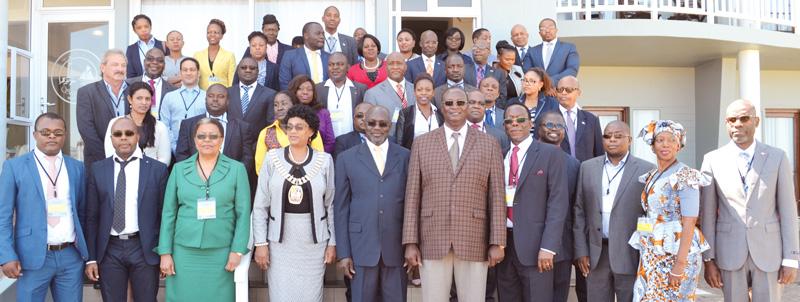
No digital divide by 2020 – Tweya

The Minister of Information and Communication Technology, Hon Tjikero Tweya alongside Information and Communication representatives from SADC held the Communications Regulators Associations of Southern Africa’s (CRASA’s) 5th Annual General Meeting (AGM) earlier this week in Swakopmund to engage in talks on the relevance of CRASA in member states.
Speaking at the two day meeting which is expected to end on 8 April Tweya said that the goal and outcomes bestowed to the ministry is assigned to address the challenges regarding telecommunications access.
Tweya disclosed that his ministry, with the technical support from the international Telecommunications Union, have drafted a Broadband Policy and an associated Implementation Plan. The honourable minister explained information and communication technology targets in Namibia will roll-out under the vanguard of the Harambee Prosperity Plan.
The most notable targets listed included: 80% of the population of Namibia to be covered by broadband services by 2020; 80% Broadband connections and usage to all primary and secondary schools in Namibia to allow e-learning by 2020; 100% coverage by digital TV and radio broadcast to all households by 2020.
“This is certainly no easy task; and I will need the uncompromising support and assistance from all Namibians from all walk of life; including the Member states of CRASA because Namibia cannot claim to have bridged the digital gap, when most, if not all African countries, could not land this fundamental human rights linked to education, health, information, shelter, food and the list goes on,” he said.
The Chairperson of the Board of Directors of the Communications Regulatory Authority of Namibia (CRAN), Ms Frieda Kishi said, “as a sector that operates a sector that has a global footprint, we can not operate in a vacuum, therefore we must continue to benchmark and harmonise our laws and enforcements for the sake of regional integration.”
Other subjects discussed at the AGM meeting addressed the need for all ICT equipment’s entering the region be subjected to intense scrutiny to verify its origin, and establish that such ICT donations are compatible between and among member countries.
Tweya further urged regional regulators to apply breakthrough thinking and find creative ways to contain exorbitant ICT cost in SADC such as the roaming as an example.
“Our Small and Medium Enterprises consisting mainly of our local people who are unable to business due to expensive charges. From an economic perspective, effective communication enhances the value of any business,” he added.
The minister noted that ICT and broadcasting infrastructure is recognized as an essential input to education, healthcare, business and participation of citizens in the information economy and the development hinges on it.













































